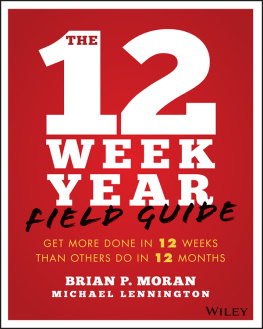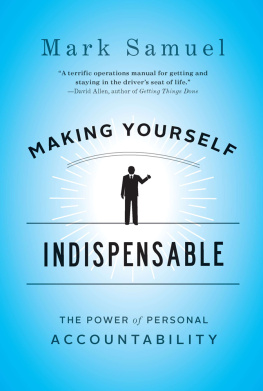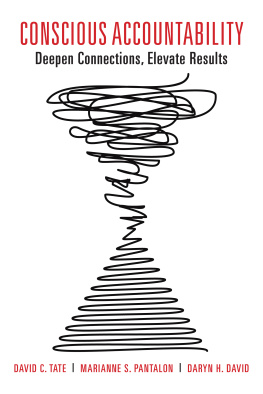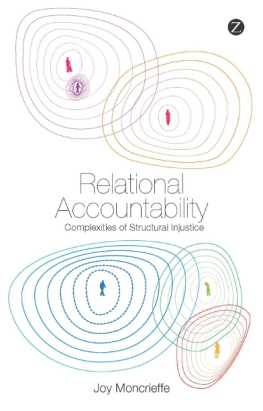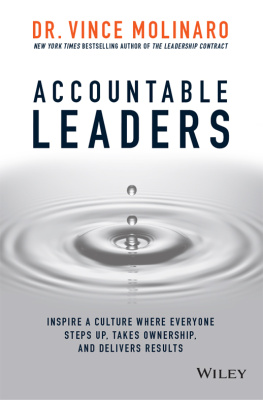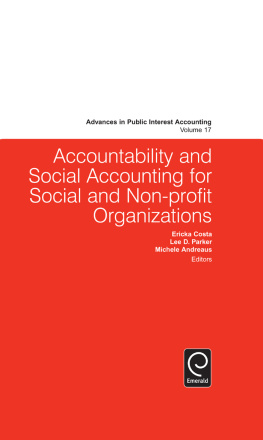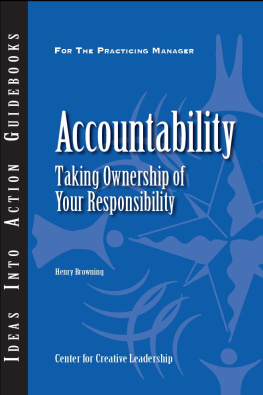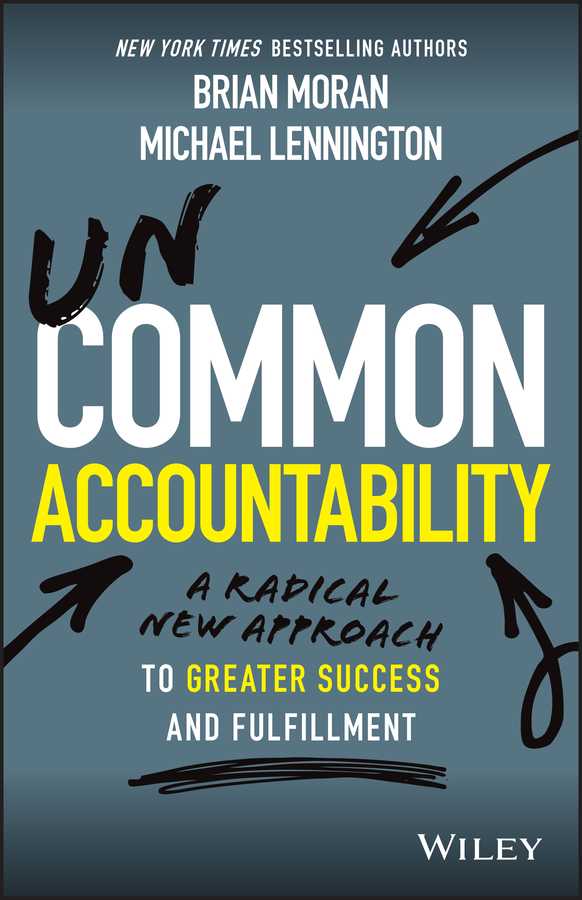
Table of Contents
List of Tables
- Chapter 1
- Chapter 3
Guide
Pages
BRIAN P. MORAN
MICHAEL LENNINGTON
UNCOMMON ACCOUNTABILITY
A RADICAL NEW APPROACH
TO GREATER SUCCESS AND FULFILLMENT

Copyright 2022 by Brian P. Moran and Michael Lennington. All rights reserved.
Published by John Wiley & Sons, Inc., Hoboken, New Jersey.
Published simultaneously in Canada.
No part of this publication may be reproduced, stored in a retrieval system, or transmitted in any form or by any means, electronic, mechanical, photocopying, recording, scanning, or otherwise, except as permitted under Section 107 or 108 of the 1976 United States Copyright Act, without either the prior written permission of the Publisher, or authorization through payment of the appropriate percopy fee to the Copyright Clearance Center, Inc., 222 Rosewood Drive, Danvers, MA 01923, (978) 7508400, fax (978) 7504470, or on the web at www.copyright.com. Requests to the Publisher for permission should be addressed to the Permissions Department, John Wiley & Sons, Inc., 111 River Street, Hoboken, NJ 07030, (201) 7486011, fax (201) 7486008, or online at http://www.wiley.com/go/permission.
Limit of Liability/Disclaimer of Warranty: While the publisher and author have used their best efforts in preparing this book, they make no representations or warranties with respect to the accuracy or completeness of the contents of this book and specifically disclaim any implied warranties of merchantability or fitness for a particular purpose. No warranty may be created or extended by sales representatives or written sales materials. The advice and strategies contained herein may not be suitable for your situation. You should consult with a professional where appropriate. Neither the publisher nor author shall be liable for any loss of profit or any other commercial damages, including but not limited to special, incidental, consequential, or other damages. Further, readers should be aware that websites listed in this work may have changed or disappeared between when this work was written and when it is read. Neither the publisher nor authors shall be liable for any loss of profit or any other commercial damages, including but not limited to special, incidental, consequential, or other damages.
For general information on our other products and services or for technical support, please contact our Customer Care Department within the United States at (800) 7622974, outside the United States at (317) 5723993 or fax (317) 5724002.
Wiley also publishes its books in a variety of electronic formats. Some content that appears in print may not be available in electronic formats. For more information about Wiley products, visit our website at www.wiley.com.
Library of Congress CataloginginPublication Data is Available:
ISBN: 9781119764922 (cloth)
ISBN: 9781119764939 (ePub)
ISBN: 9781119764946 (ePDF)
Cover Design: Wiley
Cover Image: enjoynz/Getty Images
I would like to dedicate this book to my incredible wife, Judy, and my girls, Gabrielle and Emma. In a life of many blessings, my family is my biggest blessing.
Also, thanks to the many clients who have embraced our concepts and trusted our advice.
Brian P. Moran
This book is dedicated first and foremost to my wife, Kristin, who made it possible for me to write the thing, and even better, tolerated me while I did so. I also want to thank my children and friends (you know who you are), who challenged and supported me throughout the process of getting to the finish line. Finally, a special acknowledgment to Mike and Mike, who both always understood when I couldn't show up for other things, and to Trevor, who wrote The 12 Week Year for Writers and coached me through the rough bits.
Michael Lennington

ACCOUNTABILITY AS OWNERSHIP
What if there was one basic human trait that was the foundation of virtually everything that we achieve in life? One characteristic that creates our results, fosters our learning and growth, keeps us sharp and adaptable, builds healthy relationships, improves our mental and physical health, and positively influences nearly everyone that we associate with?
And what if this one thing, this groundspring of lasting success in life, was also perhaps the most widely misunderstood concept in our culture today? What if the way that most of us think about and apply this fundamental success concept causes many to live a life of mediocrity, disappointment, and frustration rather than the life we are truly capable of? What if the way that most of us engage this concept actually creates the exact opposite of what we desire in life?
If you're like me, you're an avid reader. I learned early on that leaders are readers, and one particular area of interest for me has always been the strategies, habits, and behaviors of successful people. While I've lost count of all the books that I've read in this genre, some classics like The 7 Habits of Highly Effective People by Stephen Covey, as well as more recent works such as Atomic Habits by James Clear, stand out to me. In the end, many of these books have positively impacted my success in business, and in life.
Most of the books I've read on this topic identify a set of foundational characteristics and habits that contribute to high achievement. Interestingly, though, many of these works contain different success attributes! While this seemed confusing to me at first, I'm now fine with the variation. The diversity of ideas tells me that there is more than one formula for success in life. That, in and of itself, is encouraging. Over my career, I've applied much of what I learned from these books, and I have benefited greatly.
However, as I have applied the concepts from these books, and developed a few of my own, there is one characteristic that I've found has had by far the greatest impact on my success and my happiness. This one characteristic is common in almost all of the successful people that I've met or studied. It is the one characteristic that is the bedrock of success and achievement. In fact, without it, none of the ideas in all of the books that I've read on selfimprovement can deliver on their potential. Yet, this characteristic is also the most frequently misunderstood concept in business and in society today. And this misunderstanding creates the very opposite of what we intend.
I am talking about personal accountability, and flipping the way we understand and apply this principle is the mission of this book.
Our experience, working with over one hundred Fortune 1000 companies and tens of thousands of individuals, is that there is a fundamental misperception of what accountability truly is.
Intuitively, most sense that accountability is a good thing, something that leads to better performance and increased results, yet we most often experience accountability as something that is far less than empowering and in fact is often disempowering. Too often, accountability is synonymous with consequences in particular, negative consequences. Virtually everywhere you hear accountability mentioned in society, it is typically affiliated with bad behavior, poor performance, and negative consequences. It is a wonder that anyone would want anything to do with it.
Next page

